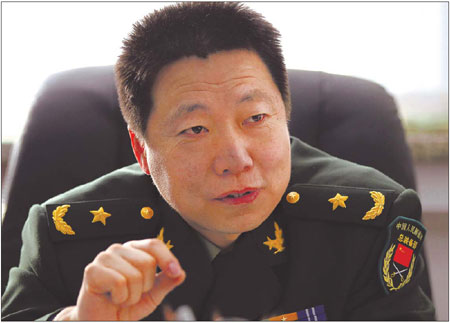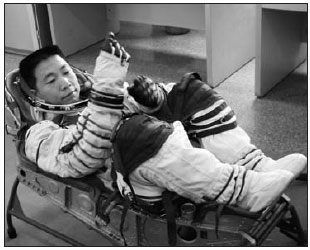People
Mission possible for Yang Liwei
Updated: 2011-01-24 08:04
By Yang Guang (China Daily)
|
Major General Yang Liwei at his office in Beijing. Xu Jingxing / China Daily |
|
Yang Liwei still regularly attends spaceflight training. Provided to China Daily |
The first Chinese man in space has an important desk job now, but is hoping to fly once more to the heavens. Yang Guang reports.
Major General Yang Liwei admits he was scared of heights as a kid but this did not hold him back from becoming China's first man in space eight years ago. Though he returned from his mission aboard Shenzhou V as a national hero, he writes in his just published autobiography, The Long March to Space, that he lost 10 kg soon after a media tour of Hong Kong, Macao and a few cities on the Chinese mainland, because he was so nervous in front of the press.
Now, the deputy director of China Manned Space Engineering Office, since May 2010, is a confident and eloquent speaker, as he showed during an interview with China Daily at his plain office on Beijing's North Third Ring Road.
Despite his administrative duties, the 46-year-old has maintained his fitness and sturdy physique, as a result of continued spaceflight training.
From Suizhong county, Liaoning province, Yang speaks with a northeastern accent, often adopted by comedians, that adds a certain geniality to his personality.
"Many years before that day (the launch on Oct 15, 2003), my fellow astronauts and I were little known to the outside world," he says. "The book is my story and our story - the story of my fellow astronauts and those who have devoted themselves to the country's space program."
It is difficult to imagine how the 8-year-old who feared heights became an astronaut who orbited the Earth 14 times, traveling more than 500,000 km during his 21-hour space voyage.
"When my mother asked me to fetch sweet potatoes from a four-meter-tall wooden shed roof, I became so nervous I broke into a sweat and couldn't do it," Yang recalls. "It was my parents who took every opportunity to develop my courage, until I climbed a 30-meter pine tree one day."
He joined the People's Liberation Army in 1983 and graduated from the air force's aviation college four years later. He was then transferred to serve in Gansu, Shaanxi, Sichuan provinces and Xinjiang Uygur autonomous region.
The toughest time of his life, he says, was in 1993 when the pilot learned to fly a fighter plane. His garrison was in a remote area and his family found it difficult to settle.
Many of Yang's 22 fellow pilots chose to transfer to civilian work at airline companies during this period because of the physical and mental demands.
"If there was a trough in my career, this was it," he says. "I felt the double burden of work and life."
In 1996, having logged 1,350 flight-hours, Yang participated in the screening process for astronauts. Out of 1,500 candidates he was one of the 14 chosen to train at the astronaut center in Beijing.
The country's first batch of would-be astronauts underwent five years of physical, technical and psychological training, receiving lessons in aviation dynamics, space navigation and rocket design, among other subjects.
"After endless rounds of overloaded training, I arrived at one rule: When you hold on till you think you can't, you are close to success," Yang says.
His selection for the space mission was only made public one day before the launch. He describes in his book the marvels he witnessed in the capsule.
"What I saw is testimony to the advance of China's manned space technology," he says. "I jotted down a line in my log to express my excitement and pride: 'The Chinese have arrived in space, for the peace and progress of humanity'."
Yang landed in the grasslands of Inner Mongolia autonomous region the next morning. For a long time afterwards, he worked with research personnel on the records of his spaceflight, described his physical and mental condition and provided suggestions.
Thanks to his feedback, over 100 improvements were made for the manned Shenzhou VI and Shenzhou VII flights. He also played an important role in the planning of later spaceflights.
As China's first person in space, Yang was honored at home and abroad. He received the title of "Space Hero" from the former chairman of the Central Military Commission Jiang Zemin. Russia awarded him the Gagarin medal. The Chinese University of Hong Kong conferred an honorary doctorate. And an asteroid was named after him.
Regarding the awards, Yang wrote a note of encouragement on his son's desk: "For you, the honors come from dad; for dad, the honors come from the army and the country."
Yang says, having spoken to his international counterparts, that Chinese astronauts shoulder a stronger sense of honor and mission, and are more inured to hardships.
For example, he says, of the first batch of 14 astronauts, all of them qualified to go into space. This compares with the international average of a 40 percent dropout rate.
"The missions we undertake are perhaps less complex," he adds, "although they are all ground-breaking."
Yang says China is currently advancing its manned space program in three steps: First, send astronauts into space and ensure their safe return; second, develop a space laboratory; third, establish a permanent manned space station.
China plans to launch two unmanned space capsules in 2011, Tiangong 1 and Shenzhou 8, which are expected to accomplish the country's first space docking.
The manned Shenzhou IX and Shenzhou X spacecrafts are scheduled to be launched in 2012 to dock with Tiangong 1 and Shenzhou 8.
A space laboratory is expected to be developed and launched before 2016. Construction of a manned space station is to be completed around 2020.
Yang says he is still in the prime of life for an astronaut and he dreams of another spaceflight, given the fact that one Russian cosmonaut has carried out six space missions, and an American astronaut made history in 1998 by flying when he was 77 years old.
"I hope my fellow astronauts and I can fly again in a few years," he says. "And I hope I don't have to wait until I'm 77 to break the record."
Specials

President Hu visits the US
President Hu Jintao is on a state visit to the US from Jan 18 to 21.

Ancient life
The discovery of the fossile of a female pterosaur nicknamed as Mrs T and her un-laid egg are shedding new light on ancient mysteries.

Economic Figures
China's GDP growth jumped 10.3 percent year-on-year in 2010, boosted by a faster-than-expected 9.8 percent expansion in the fourth quarter.

